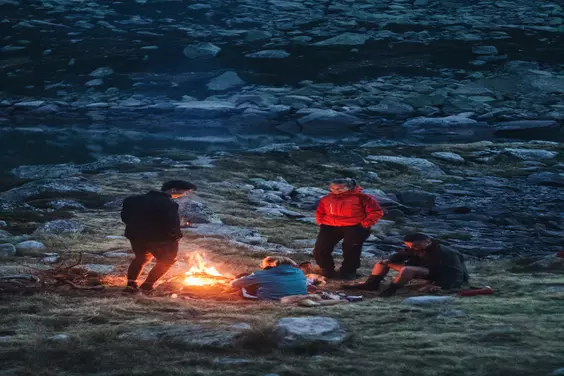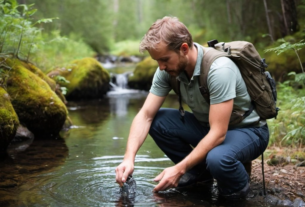Introduction
In an age where technology, digital connectivity, and modern comforts are at the forefront, one might question the relevance of acquiring basic survival skills. However, in a world marked by rapid change and unforeseen challenges, mastering these fundamental skills remains as essential as ever. The ability to take care of oneself and others during critical situations, ranging from natural disasters to unexpected emergencies, serves as the bedrock of preparedness. This extensive article will delve deeply into the significance of basic survival skills, providing comprehensive insights into why they are essential in our age of convenience.
I. Emergency Preparedness:
In a world characterized by unpredictability, being prepared for emergencies is paramount. Emergencies can take myriad forms, from natural disasters to unforeseen power outages or accidents.
Emergencies: Unpredictable and Omnipresent
Emergencies, by their very nature, are unpredictable and omnipresent. The frequency and severity of natural disasters, such as hurricanes, earthquakes, and wildfires, are on the rise due to climate change. Furthermore, seemingly ordinary situations, like car breakdowns, can swiftly escalate into emergencies when one lacks the knowledge and skills to handle them.
How Basic Survival Skills Enhance Emergency Preparedness
Basic survival skills empower individuals to take control of critical situations when external help is either unavailable or significantly delayed. These skills constitute the foundation of self-reliance, equipping individuals with the tools and knowledge necessary to navigate crises effectively.
For instance, understanding first aid can be the difference between life and death in the immediate aftermath of an accident or disaster. Knowledge of how to treat wounds, manage shock, or perform CPR can prove invaluable when professional medical assistance is unavailable.
II. Self-Reliance:
In an era where dependence on external systems and services is pervasive, the concept of self-reliance may appear antiquated. However, the ability to rely on oneself in challenging or emergency situations is profoundly empowering.
The Confidence of Self-Reliance
Basic survival skills instill a profound sense of confidence in one’s ability to navigate the unknown and confront unforeseen challenges head-on. This confidence extends beyond practical problem-solving; it encompasses one’s mental and emotional well-being in times of crisis.
Breaking Free from Dependency
In an age characterized by dependence on technology and external services, mastering basic survival skills represents a return to self-sufficiency. It signifies breaking free from the constraints of reliance on readily available resources and developing the ability to thrive even when modern conveniences are scarce or nonexistent.
III. Outdoor Adventures:
The allure of outdoor adventures remains as strong as ever. Whether it’s hiking through pristine wilderness, camping beneath the starry night sky, or venturing into uncharted territories, outdoor activities offer a profound connection to nature and the thrill of exploration. However, they also come with inherent risks that demand a basic understanding of survival skills.
The Thrill and Risks of the Great Outdoors

Exploring the great outdoors is an exhilarating endeavor, but it can also be fraught with danger. When venturing into remote areas, individuals often find themselves far removed from the safety nets of civilization. Therefore, understanding basic survival skills becomes not just valuable but crucial.
Surviving and Thriving in the Wilderness
Learning survival skills equips outdoor enthusiasts with the knowledge and tools necessary to navigate unfamiliar terrain successfully. Whether it’s building a shelter, starting a fire, identifying edible plants, or purifying water from natural sources, these skills are vital for not only surviving but thriving in the wilderness.
IV. Unpredictable Situations:
Life is characterized by its unpredictability. Unexpected situations can arise at any moment, and basic survival skills can be the deciding factor between chaos and control.
Navigating the Unforeseen
Unpredictable situations can take various forms. You might find yourself lost in the wilderness while hiking, caught in a severe storm without power, or facing a sudden breakdown of your vehicle in a remote area. In these moments, having a basic understanding of survival skills can help you remain calm and think rationally, dramatically increasing your chances of successfully overcoming the challenge.
Emergency Scenarios in Everyday Life
Basic survival skills are not confined to wilderness or extreme scenarios. They are equally applicable to everyday life. For instance, knowing how to perform basic first aid can be invaluable in the event of a household accident, and understanding how to purify water can be crucial during a municipal water supply disruption.
V. Practicality and Adaptability:
Survival skills go beyond physical survival; they teach practicality and adaptability, qualities that are invaluable in various aspects of life.
Problem-Solving and Resourcefulness
Learning survival skills hones your problem-solving abilities and resourcefulness. You become adept at making the best use of available resources, which can be valuable in everyday challenges.
Embracing a Mindset of Preparedness
Survival skills encourage a mindset of preparedness. Instead of reacting to crises with panic, you approach them with a methodical and proactive attitude, significantly increasing your chances of success.
VI. Self-Sufficiency and Sustainability:
The skills acquired through survival training not only enhance your ability to survive but also promote self-sufficiency and sustainability.
Reduced Environmental Impact
Survival skills often involve responsible resource use. By understanding how to make the most of available resources, you can minimize your environmental impact and contribute to a more sustainable future.
Food Security
Basic survival skills encompass knowledge of identifying edible plants and sources of food in the wild. This knowledge can be invaluable for those interested in foraging or seeking food security in challenging times.
VII. Frequently Asked Questions (FAQs)
Q1. What are the fundamental survival skills that everyone should know?
A1. Some fundamental survival skills include building a shelter, starting a fire, finding clean water, basic first aid, navigation using a compass or GPS, and identifying edible plants.
Q2. Is it necessary to be an expert in survival skills to benefit from them?
A2. No, you don’t need to be an expert. Even a basic understanding of survival skills can be immensely helpful in emergencies. Continuous learning and practice can further enhance your abilities over time.
Q3. Are survival skills exclusively for wilderness situations?
A3. While survival skills are particularly useful in wilderness settings, they are also applicable in urban or suburban environments during emergencies like power outages, natural disasters, or accidents.
Q4. How can I begin learning survival skills?
A4. You can start by enrolling in basic survival courses offered by reputable organizations or instructors. Additionally, reading books on the subject, watching instructional videos, and practicing in a safe environment can all contribute to your skill development.
Conclusion
In a world characterized by rapid technological advancement and modern comforts, basic survival skills continue to hold immense relevance. They offer not only a pathway to self-sufficiency and self-confidence but also a means of thriving in an unpredictable world. Whether you’re an outdoor enthusiast, an urban dweller, or simply someone looking to enhance your preparedness for life’s uncertainties, the value of basic survival skills is universal and enduring. It equips you with the tools and knowledge necessary to confront life’s challenges with confidence and competence. As you embark on the path of learning these skills, remember that you are not merely preparing for survival; you are preparing for a life enriched by resilience, adaptability, and the profound satisfaction of self-reliance.



